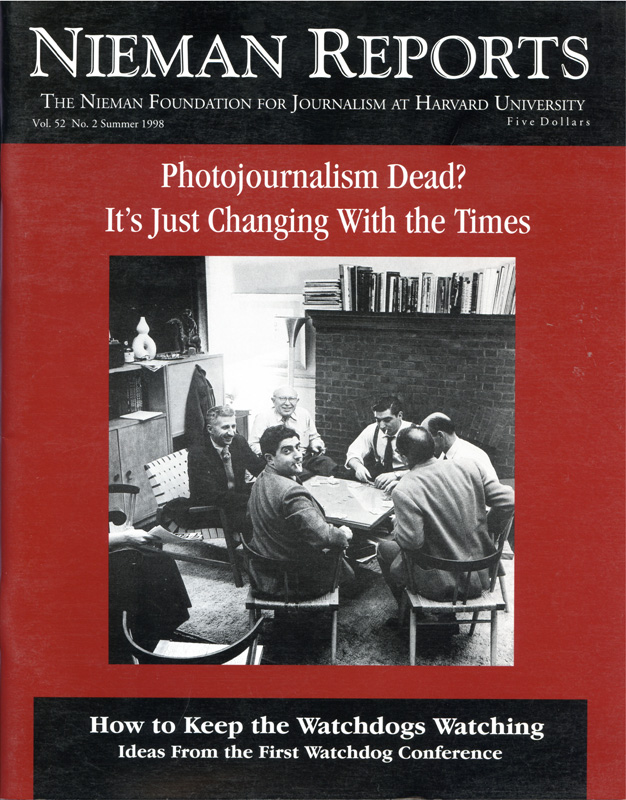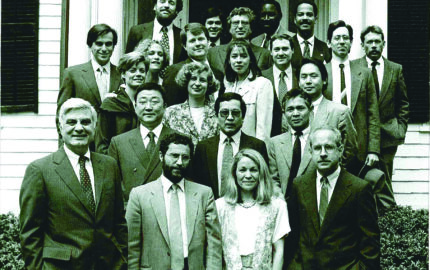After listening to a day and a half of debate and discussion about the role of watchdog journalism, I am more convinced than ever that this genre of aggressive reporting on issues of public importance is an overlooked and underdeveloped tonic to many of the problems confronting journalism and public life today.
This issue of Nieman Reports records the highlights of the thinking and the ideas of 24 journalists whose work spans more than half of this century. Along with an audience that included this year’s class of Nieman Fellows, they inaugurated the first investment of the Murrey and Fran Marder Watchdog Journalism Fund at a conference in May. As you can read in this Summer issue—as well as in the Spring issue and the coming Fall issue of Nieman Reports—what they did was clarify the need for aggressive watchdog journalism. They also talked of the obstacles that frustrate the work and of ways to overcome those obstacles.
But what they did most consistently was to argue that editors should go beyond limiting aggressive monitoring of institutions and people of power to special project teams and isolated series. Instead, watchdog journalism should be an integral part of the daily work of the news departments, including regular trends and beat coverage.
What they proposed was a natural progression in the development of a journalism more closely related to the needs of a self-governing society in an increasingly complex world. The watchdog concept came into being during a time of dislocation and transition at the end of the last century very similar to the period we are passing through now. It was a time when industrialization spawned new concepts of government and social organization. In that time journalists like Lincoln Steffens asked new questions about government behavior while Ida Tarbell asked the first questions about new centers of private power.
Their example demonstrates that watchdog journalism at its best helps alert a community to changing circumstances affecting their lives. It goes beyond a simple journalism of witness. Embedded in each watchdog story are the elements of disclosure and judgment, which often point to victims and wrongdoers. By probing below and beyond surface information, by challenging assumptions and assertions, this reporting invites a civic judgment. Either a newly aware public moves to redress matters or accepts things as they are by ignoring the disclosure.
Today there is a dangerous rush to meet criticism of press behavior by entering into league with other community power blocs or by publishing more “good” news and entertainment—dangerous because the journalist is no longer a disinterested monitor of public actions or because the journalist simply abandons the role entirely.
If there is a truism about a news organization serving the public interest in a democracy it is that it is filled with sound and fury and that it stands apart from other powerful interests. This is so because a free society is in a constant and noisy debate, reshaping itself to changing times and conditions. Each change throws up new vested interests. Today these interests concern abortion, racial division, taxes, government power—issues about which the public has arrived at no comfortable compromise.
Democracy resolves these fundamental conflicts about justice, equity and distribution of resources only after raucous argument and debate. News organizations that choose to avoid controversial and divisive subjects invite a public to stand apart in splendid self-interested isolation. News reports that choose to examine and illuminate the things that divide us give its citizens at least the option of engaging in the decision-making process.
Beyond promoting the watchdog concept, the conference participants offered some important cautions and some suggestions that might strengthen watchdog journalism, including:
- In an increasingly wired international community in which anyone with a computer can read dozens of international newspapers at will, American journalists must find new ways to report international news that makes it less foreign and makes its importance obvious and clear;
- Greater attention needs to be paid to the corrosive force of a free and unfettered market economy as corporate power exerts its influence through campaign contributions, public advertising campaigns, lobbies and economic blackmail to make private deals on public issues and have the power to undermine public confidence in representative government, legal restraint and traditional values;
- There is a need to develop new approaches to the way we monitor institutions of power by asking such questions as: What prevents the institution from achieving its stated goals? A question that can shape new measures of performance to replace much of the fragmented, confusing ad hoc reporting being done today;
- As stories become more complex and more specialized, there is ever more need for greater specialized knowledge on the part of the reporters and editors who do this work.
Finally, and maybe most importantly, as Murrey Marder said at the conclusion of the conference:
“If we want the public to see us as sound and reliable watchdogs on the use of power in the next millennium, not attack dogs or lapdogs, then we must cultivate qualities that command respect.”



